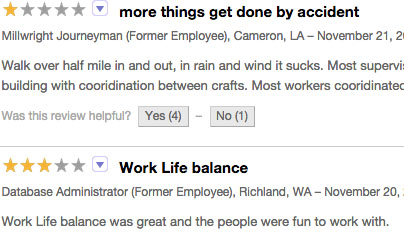Posting on a prominent online job review site, an employee of one of the world’s top engineering and construction management firms lauds it as a “good company” with “great benefits.”
Not so, fumed someone else, claiming to be a fellow employee. “You are a tool for (unnamed company). They pay handsomely for that tool but when they don’t need you anymore they put you away.”
The online world can be a particularly brutal one for contractors, engineers and construction services firms.
The explosion in social media and online feedback to news media coverage have opened up multiple venues for embittered employees—former and current—and angry customers or subcontractors to vent at the targeted company's expense.
As with recommendations on hotel websites, a percentage of the comments posted are made anonymously by supporters or rivals of the businesses being reviewed. Staying abreast of what is posted, and replying promptly in a constructive tone, is recognized as the best way to keep any possible reputation damage contained, media risk experts say.
Construction, squeezed for profit and mindful of costs, lags behind other industries in its use of social media and in attention to media relations in general, with larger designers and contractors more likely to have a presence on social media than smaller and mid-sized firms, say communications consultants.
When social media was first gaining traction in the business world in 2011, most employees and employers' biggest concern was the amount of time they needed to devote to different channels to exploit their potential.
But four years later—with the rapid posting of comments on recruitment and news websites, the proliferation of social media tools and the sheer vastness and anonymity of the electronic echo chamber—a new set of challenges has emerged.
Firms that are caught unprepared for public criticism on social media and websites, with their ever-lengthening comment chains, or have not developed a strategy for courting the traditional media world of newspapers and broadcasting, could put themselves and their employees at risk, says Roland Schatz, CEO of Switzerland-based Media Tenor International.
“In today’s world you have to be good at manipulating all channels of communication," says Schatz, a leading media impact researcher whose firm advises companies on how to manage their reputations in both traditional and social media. "They are just not prepared for it.”
The Drip, Drip, Drip
Schatz and other expert says it’s not just the threat of a negative story going viral and tarnishing in a matter of minutes a business reputation built painstakingly over years or decades, one project at a time, that companies need to worry about.
Firms also can sustain damage from the steady drip, drip, drip of negative commentary and withering putdowns on multiple job review sites.
While websites such as Glass Door or Career Bliss feature plenty of positive comments about top construction companies and engineering firms, they are also a magnet for the disgruntled who can easily peddle a mixture of rumor, innuendo and caustic critiques mixed with the occasional insider insight.
Major industry contractors typically attract several hundred, and as many as a few thousand reviews.
Some are downright outrageous or somewhat easily dismissed as sour grapes.
The review of one major contractor leaves little to the imagination in its headline—contending that “certain staff and especially the senior engineer and HR people are vengeful, vindictive and racist.”
Other comments are harder to parse—offering praise followed by a nasty dig or two that seems to undo the positive review.
One “superintendent” praised his company as the “best in the northwest,” only to follow that with a warning that effectively skewers the company’s entire management structure. “Senior engineers will “throw you under the bus,” while the company is also packed with “middle management suck ups!”
“Social media unfortunately can give rise to fake whistle blowers,” said Charles Field, a Boston area public relations consultant who has worked closely over the years with various construction contractors. “People can make statements that would injure your reputation without any filter.”
Unchecked Criticism
In addition to what's posted as news article responses and on well-used social media sites such as Facebook or Linked In, companies also have to worry about blogs and their often free-wheeling comment sections.
Such comments, unchecked or unbalanced by more accurate or positive portrayals of a company and with a wide potential audience, can have a deleterious impact on a company’s reputation, especially in hiring new talent, Field and other media risk experts contend.
The concern is not just the negative comments themselves but also how they fit into the totality of what a potential job recruit or customer will find in an online search.
Job seekers and others will discount to a certain extent the reviews they read on Glass Door or other rating sites, knowing some people have axes to grind, Field said.
But he adds that seeing a mass of negative commentary online about a company on job review sites and other venues can overwhelm any positive news or announcements and present a skewed image that can be damaging, he added.
For contractors and engineering firms looking to take action, Fields suggests buying software that can track every mention of the company’s name or working with a media consulting firm that has it.
Looking for Patterns
The process then becomes one of sifting through the various comments to identify any patterns or critics who may have online influence through followers or friends on Twitter, Facebook and other social media platforms.
Each case has to be considered separately depending on the potential damage caused by letting the comment go unchallenged and the social media influence of the individual who made the remarks, if identifiable.
The company may then want to enlist its legal department or outside counsel to contact the person behind the comments and see if they can’t be removed.
“You have people who want to take down companies,” Field said. “They can start a social media campaign and it can be very destructive.”
Some industry firms say the best defense when it comes to media risk may be a good offense.
Turner Construction Co. does not have a dedicated social media staff or director, but various communications office specialists chip in with various online contributions.
“For us, it’s an added piece of our communications and outreach,” said Christopher McFadden, Turner communications vice president. “It’s probably not the centerpiece of what we do but it’s part of our program.”
The contractor also monitors what’s being said about it on Glassdoor and on various industry blogs and websites.
When the contractor comes across critical comments, it tries to respond, including taking action if there is a legitimate concern.
Overall, Turner gets high ratings in surveys of college students about potential employers.
“We are engaged in social media as new sites come up and other sites fade away,” McFadden said. “We have been pretty lucky, there haven’t been brutal things said about us.”
Boston-based Suffolk Construction has an active social media campaign directed by a veteran ad executive as part of the company’s public relations, advertising and marketing efforts.
Weighing the Cost
But other firms have yet to invest in social media, seeing it as another cost that counts against the bottom line.
“You take an industry where cost and profit have always been measured by time and material and to most construction companies, a communications budget is a cost center, not a profit center,” said Andrew Paven, a senior vice president of O’Neill and Associates, who served as spokesman for Bechtel during its multibillion-dollar Central Artery/Tunnel Project in Boston.
But with image key in the construction field, companies need to not only track who’s mentioning them and why, but to take proactive steps to counter misinformation.
“Brand and reputation are huge and tangible assets,” said Mark Beasley, director of the Enterprise Risk Management Initiative at North Carolina State University. “Being more proactive will increase the odds of being better prepared for a reputation event.”
Media expert Schatz, who co-authored a 2007 Harvard Business Review piece called “Reputation and Its Risks,” argues that industry firms without good media crisis management plans can be left with limited options should a negative story go viral or a disaster on a worksite triggers a media feeding frenzy.
“They don’t think ‘I need to build a shelter in order to defend myself in those times when I am facing attack,’” Schatz said.
Rocked by revelations that it made cars designed to cheat on auto emissions tests, Volkswagen would seem to be an odd success story.
But the German auto giant is not likely to go out of business, with a well-known brand and the ability to get its message out through multiple media outlets and channels, Schatz argued.
If the crisis like the one that has damaged VW’s brand were to hit a major contractor or engineering firm, it would face much more dire challenges.
“If that happened in the construction industry, the company would be out of business,” Schatz said. “When it comes to reputation, the construction industry is building on sand and not thinking about where the foundation is.”



